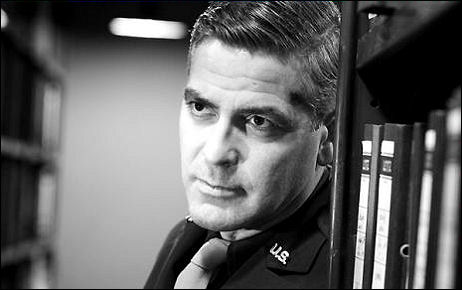N.Y. Times columnist Caryn James is calling George Clooney the definitive yesteryear movie star because his films are almost always “period” in one way or another. His next film, Leatherheads, which he directed and starred in, is a 1920s football tale, she reports. Clooney’s live-TV, black-and-white production of Fail Safe was a time-capsule thriller pulled from the early ’60s. O Brother, Where Art Thou? was a ’30s Depression-era piece. The Good German is a post-war Germany Michael Curtiz deal.

What else? Good Night, and Good Luck is set in the mid ’50s McCarthy area. Confessions of a Dangerous Mind goes from the √ɬ¢√¢‚Äö¬¨√¢‚Äû¬¢60s to the √ɬ¢√¢‚Äö¬¨√¢‚Äû¬¢80s and doesn’t touch the present. Intolerable Cruelty is an updated ’30s screwball comedy. Clooney wanted to do a TV version of Network, the 1976 Paddy Chayefsky-Sidney Lumet classic. Ocean√ɬ¢√¢‚Äö¬¨√¢‚Äû¬¢s Eleven and its sequels are tributes to early ’60s Rat Pack Vegas. Even the contemporary Michael Clayton is tonally a √ɬ¢√¢‚Äö¬¨√¢‚Äû¬¢70s political thriller.
All these examples have been noted by James except the Fail-Safe and Network projects.
“As [Clooney] sees things, it was not nostalgia but a search for strong, unusual material that led him to the past. ‘I think we all have these ideas: The world was better then, clearer, easier,’ but making so many period films ‘wasn√ɬ¢√¢‚Äö¬¨√¢‚Äû¬¢t in any way a conscious thing,’ he said. ‘I did some contemporary pieces that weren√ɬ¢√¢‚Äö¬¨√¢‚Äû¬¢t very good,’ then started making different choices.”
Oh, and Deadline Hollywood Daily’s Nikki Finke reported a little while ago that no one is confirming that Times Of London John Harlow article that Clooney was a “major force” behind the union A-Listers refusing to cross picket lines to attend a televised Golden Globes, etc.
